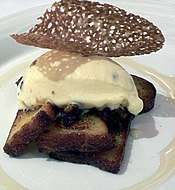Tuile
A tuile is a baked wafer, French in origin, generally arced in shape, wafer thin, crisp, sweet, or savory, that is made most often from dough (but also possibly from cheese), often served as an accompaniment of other dishes.[1] Tuile is the French word for tile, after the shape of roof tiles that the arced baked good most often resembles.[2] Tuiles are commonly added as garnishes to desserts such as panna cotta or used as edible cups for sorbet or ice cream.[3]
.jpg) A tuile arced over a creme caramel dessert | |
| Type | Cookie or wafer |
|---|---|
| Place of origin | France |
| Main ingredients | Flour, white sugar, butter, and almonds |
Preparation
Tuiles are thin cookies named for and curved like the tuiles, or tiles, that line the rooftops of French country homes, particularly those in Provence.[4] To get a curved shape, tuiles are usually made on a curved surface, such as a wine bottle or rolling pin.[5] In France, tuile molds are also sold. Tuiles must be curved while they are hot, otherwise they will crack and break.[6] Tuiles can also be left flat after baking. The traditional tuile batter consists of flour, white sugar, melted butter, and almonds. Modern variants include a wide variety of bases and flavours (see gallery).
Gallery
.jpg) A simple bread tuile served with foie gras.
A simple bread tuile served with foie gras. A cinnamon tuile over French toast and ice cream.
A cinnamon tuile over French toast and ice cream. A honey tuile over cups containing a sweetened cream, ginger panna cotta.
A honey tuile over cups containing a sweetened cream, ginger panna cotta.
References
- Biró, Marcel, and Shannon Kring. Biró: European-Inspired Cuisine. Gibbs Smith, 2005. 114. Print.
- Boulud, Daniel, and Dorie Greenspan. Daniel Boulud's Café Boulud cookbook: French-American recipes for the home cook. Scribner, 1999. 165. Print.
- W., Carol, Erik Tieze, and Glenn Humphry. Creating Chefs: A Journey Through Culinary School with Recipes and Lessons. Lyons Press, 2005. 228. Print.
- Greenspan, Dorie, and Alan Richardson. Baking: From My Home to Yours. Houghton Mifflin Harcourt, 2006. 173. Print.
- McCarty, Michael, Judith Choate, Liz Smith, and Steve Pool. Welcome to Michael's: Great Food, Great People, Great Party!. Little Brown & Co, 2007. Print.
- Luchetti, Emily, and Sheri Giblin. Classic Stars Desserts: Favorite Recipes by Emily Luchetti. Chronicle Books Llc, 2007. 129. Print.
External links
